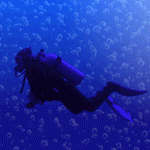You can take all you want in your checked baggage. For carry-on, TSA is "supposed" to allow medical supplies along with your MND (medically necessary device). Haven't tested that. I would clearly label it "Distilled Water for CPAP use" or something. Or perhaps carry a factory sealed and labeled container.schwawi wrote:has anyone tried traveling with distilled water? can you get it through security? I travel every week and have been going without humidifier so far since its summer, but I expect I will need it in the winter.
Distilled water?
Re: Distilled water?
The OSA patient died quietly in his sleep.
Unlike his passengers who died screaming as the car went over the cliff...
Unlike his passengers who died screaming as the car went over the cliff...
Re: Distilled water?
Can't speak for you, but *I'm* not a fish. I DO, however, quite often swim in my pool, which is chlorinated to many times the level of municipal tap water. And I generally breathe the air just above the pool water. At times you can smell the chlorine. I've survived the ordeal thus far, with not so much as a cough. In fact, it's entirely possible that my exposure to minute quantities of inhaled chlorine has staved off respiratory infections caused by inhaled microbes. There's just as much incidental evidence of that as there is that it's harmful in the quantities we're talking about.DreamDiver wrote: Anyone ever put tap water straight into an aquarium full of fresh-water fish? No. The chlorine would kill your fish. Why expose ourselves to something we really know so little about, when all the environmental figures point to danger?
If your tap water is such that you can smell chlorine outgassing, you probably aren't going to use it in your machine just because of the smell.
What "environmental figures point to danger"? I use distilled. I advise others to, as well, to protect their humidifier tanks. But I've yet to see anything from a reputable source that using tap water is a health problem. Just a WHOLE lot of conjecture, misinformation and bad science. Statements from people who should know better like "Don't put anything in your machine that you wouldn't want in your lungs." Well, I wouldn't want distilled, filtered and blessed by the Pope water in my lungs. But that's just me...
Or those who say "Look at the crud in your tank from tap water. You want that in your lungs?" Hmmmm...why do they think it builds up IN THE TANK?
I really would like to see the danger-pointing figures you alluded to, tho.
Use distilled water! But for the right reasons. It will make your tank last longer. And maybe you'll even sleep better.
The OSA patient died quietly in his sleep.
Unlike his passengers who died screaming as the car went over the cliff...
Unlike his passengers who died screaming as the car went over the cliff...
- DreamDiver
- Posts: 3082
- Joined: Thu Oct 04, 2007 11:19 am
Re: Distilled water?
LinkC, you know you're not going to fill your tank with straight chlorox because you would probably damage your lungs.LinkC wrote: I really would like to see the danger-pointing figures you alluded to, tho.
There are two methods of injury here. The first is short-term or 'acute' injury - such as burnt lung tissue from breathing straight chlorine gas. http://www.informahealthcare.com/doi/ab ... 0802007841
The second is long-term low-level or 'chronic' exposure. With a quick google search, I did find a secondary source:
http://www.michigan.gov/documents/Chlor ... 2357_7.pdf
The problem is that nobody is interested in doing long-term chronic exposure studies. Long-term studies are expensive, and probably could not survive from one governmental administration to the next as funding priorities change. Corporations don't like losing a revenue source, and if their own private studies proved that something they sell is unhealthy, it's best just not to fund the study - or bury it. They aren't legally bound to publish detrimental results. They probably don't publish any results until after they can patent something from it.Long-term (chronic) effects:
• Long-term exposure to low levels of chlorine gas is potentially linked to diseases of the
lung (bronchitis, shortness of breath, possible permanent damage) and tooth corrosion.
• No cancer or reproductive effects have been reported from chronic exposure to chlorine.
Scientists always say, "Prove what you say is true." I cannot help but wonder why nobody is saying back: "You prove that it isn't true." Tobacco was "not a health risk" because nobody had any proof for how long? Aids was not a real disease for how many years before people finally discovered the virus? Yes - I'll grant that all we have right now for the most part are anecdotal experiences, but they come from a growing number of people.
It's not like I'm saying "Plieadian aliens are coming to take us away", here. Remember DDT? I remember a video where kids were bicycling through the cloud of fumes behind the government fumigation trucks in suburban neighborhoods. The government-sponsored video was created to show how 'safe' DDT was. It's banned today.
Sir, I prefer the precautionary principle: We know immediate overexposure to chlorine gas can cook lungs. That's bad. You prove to me that long-term exposure to low levels of chlorine gas is not a health risk to any cross-section of the human population: perhaps infants or the elderly. Then we can reach a middle ground.
Lasers were once impossible. Teleporation was once impossible. (They can do it today, but only one atom at a time. It's true.) It's ironic to talk about 'true' or 'real' science and 'right reasons.' Scientists who always say 'prove it's true' never stop to think it might be wiser and more efficient to prove something is not true, often because that would fail to line their wallets for seventeen years from a lousy patent at the expense of a sustainable foreseeable future.
I've noticed that when we stopped using tap water to cook in our Revere-ware pots, the stainless steel stopped getting more pitted inside the pot. You say it damages the humidifier tank too. Both of these are long-term physical effects on inanimate objects. What does that say about chlorinated water? I cannot help but wonder what effects tap water would have on my lungs over the course of years if I used it in my tank. Ugh.
We can at least agree that distilled water is best - even if it is for different reasons.
_________________
| Mask: ResMed AirFit™ F20 Mask with Headgear + 2 Replacement Cushions |
| Additional Comments: Pressure: APAP 10.4 | 11.8 | Also Quattro FX FF, Simplus FF |
- spacetoast
- Posts: 174
- Joined: Mon Aug 10, 2009 4:23 pm
- Location: Golden, CO
Re: Distilled water?
Just for the record...
I've been using filtered water in my machine for the last week and a half. I have just filled up my humidifier compartment for the third time (about 12 ounces or so) and I have noticed some mineralization starting to form on the bottom and sides of the compartment. So, I'll be switching to distilled water to avoid having to clean the compartment out.
In a pinch, I still would not have an issue with putting filtered or bottled water in there.
I've been using filtered water in my machine for the last week and a half. I have just filled up my humidifier compartment for the third time (about 12 ounces or so) and I have noticed some mineralization starting to form on the bottom and sides of the compartment. So, I'll be switching to distilled water to avoid having to clean the compartment out.
In a pinch, I still would not have an issue with putting filtered or bottled water in there.
- plumtuckered
- Posts: 21
- Joined: Tue Aug 25, 2009 10:52 pm
- Location: Alabama
Re: Distilled water?
I would rather be safe than sorry. If anything (bacteria, fungi or viruses) are growing in your tank, they can get in your lungs! The flow of air through the tank can pick up and carry all sorts of microscopic critters. Some bugs can grow in almost anything. When I was in Med Tech school we actually cultured a bug called Pseudomonas that was living in the bottle of antibacterial hand cleanser we used in the lab!














